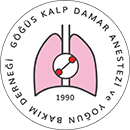

Potential Role of Erector Spinae Plane Block on Neutrophil-Lymphocyte Ratio in Cardiac Surgery Patients
Aslıhan Aykut, Nevriye Salman, Zeliha Aslı Demir, Ümit Karadeniz, Ayşegül ÖzgökDepartment of Anesthesiology and Reanimation, University of Health Sciences, Ankara Bilkent City Hospital, Ankara, TürkiyeObjectives: In cardiac surgery, a successful erector spinae plane (ESP) block has been demonstrated within the scope of multimodal analgesic approach. This study aimed to comparatively evaluate the effect of ESP block used in cardiac surgery on neutrophil-lymphocyte ratio (NLR).
Methods: Patients who underwent an ESP block and conventional analgesia technique for coronary artery bypass grafting surgery were retrospectively compared. Postoperative pain scores, analgesic consumption, extubation times, and intensive care unit (ICU) and hospital stays were recorded with patient and operative data. As the studys primary outcome, NLR values were calculated from the hemogram as an indicator of inflammation during the preoperative period and 3 days postoperatively.
Results: A total of 97 patients who underwent coronary artery bypass graft surgery with cardiopulmonary bypass were investigated. The highest pain score (p=0.016), total opioid (p=0.008) and acetaminophen (p=0.009) consumption, extubation (p=0.024), and ICU stay (p=0.045) in the first 24 h after extubation were significantly lower in the ESP group. NLR (p=0.019, p=0.046, and p=0.038, respectively) was significantly lower in the ESP group in the first 3 days.
Conclusion: In addition to being associated with less opioid use in the first 24 h in the postoperative pain management of cardiac surgery, ESP block reduces NLR 3 days postoperatively.
Makale Dili: İngilizce
(398 kere indirildi)

















